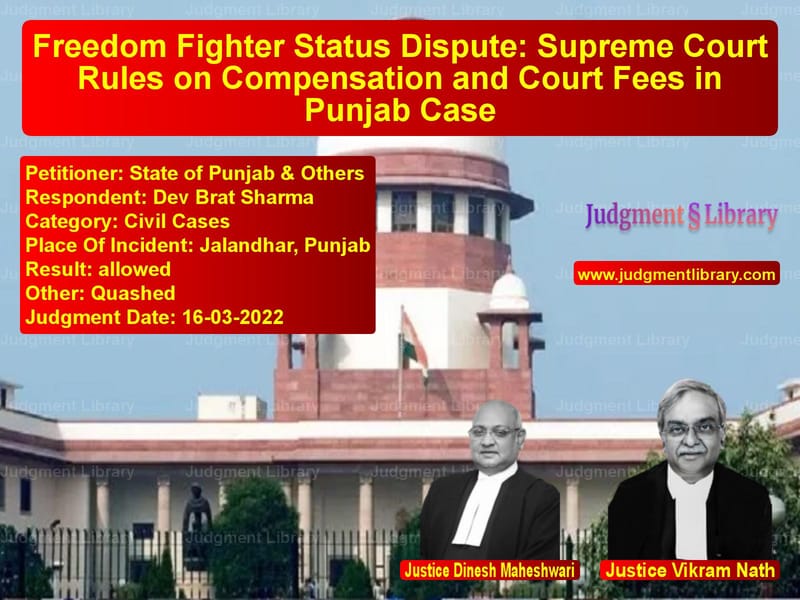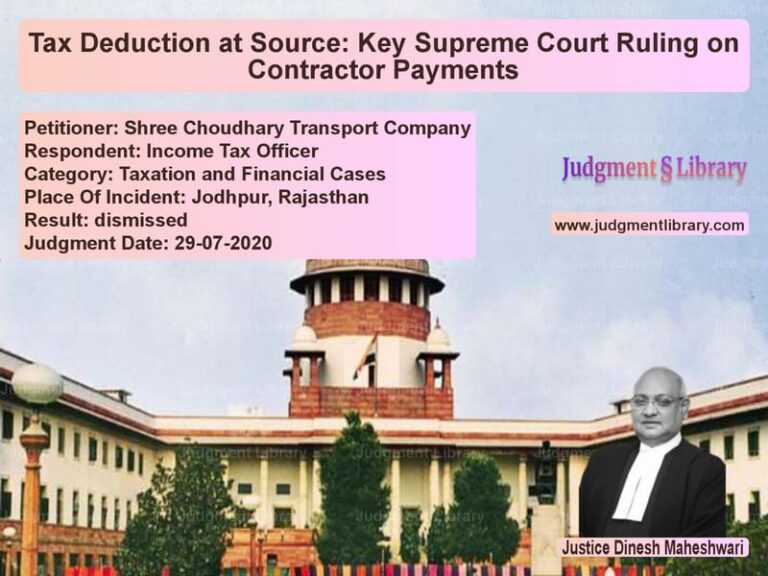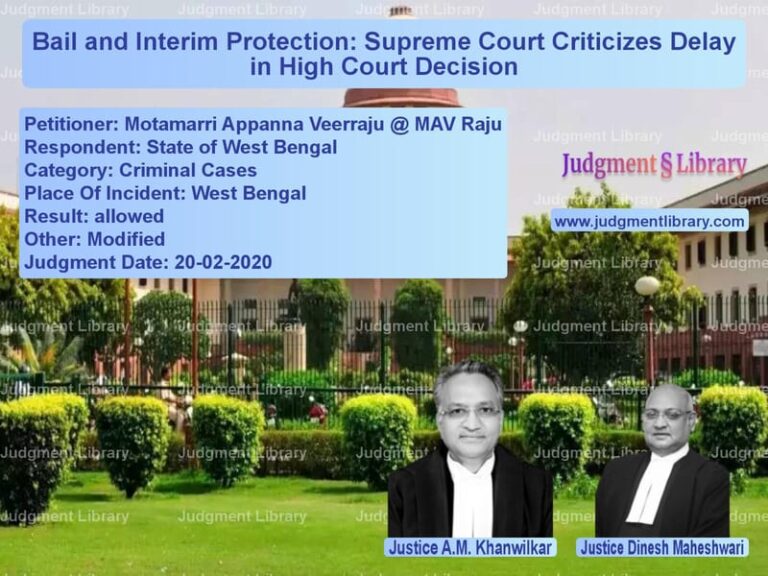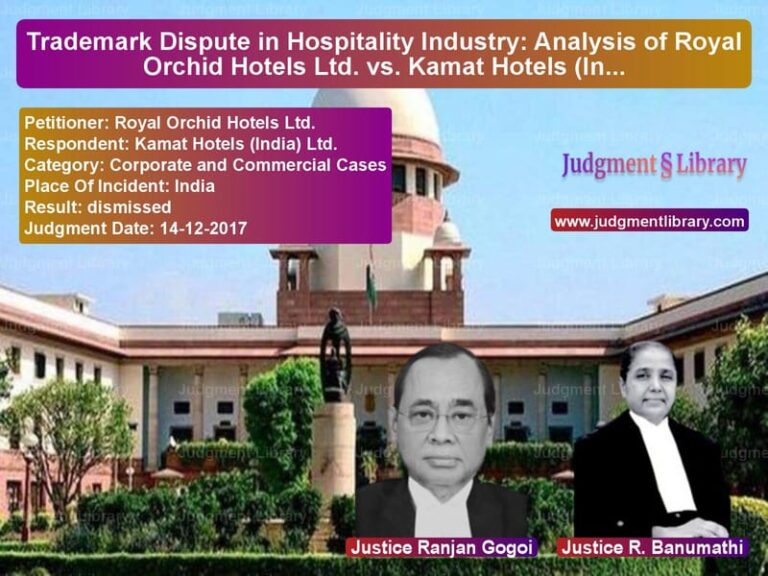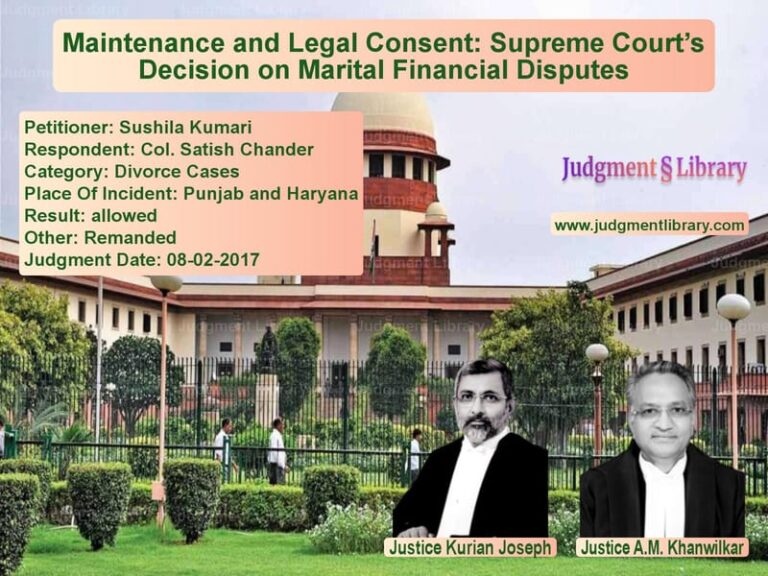Freedom Fighter Status Dispute: Supreme Court Rules on Compensation and Court Fees in Punjab Case
The case of State of Punjab & Others vs. Dev Brat Sharma revolves around a long-standing dispute over the recognition of a freedom fighter status and a claim for compensation. The respondent, Dev Brat Sharma, had filed a suit seeking Rs. 20 lakhs as damages for the mental agony and loss of reputation caused by the denial of his freedom fighter status by the State of Punjab. The Supreme Court, in this ruling, addressed key legal questions related to compensation claims, court fees, and procedural correctness.
Background of the Case
Dev Brat Sharma, a retired District Development and Panchayat Officer (DDPO), claimed that he was a recognized freedom fighter in Punjab but was denied the official certificate by the authorities. He filed multiple writ petitions before the Punjab and Haryana High Court to challenge this denial and ultimately succeeded in obtaining a favorable judgment. However, he later filed a civil suit demanding Rs. 20 lakhs as compensation for the distress he suffered due to the wrongful denial.
Read also: https://judgmentlibrary.com/supreme-court-dismisses-review-petition-in-urban-land-ceiling-case/
The suit was registered before the Civil Judge (Senior Division), Jalandhar, and was contested by the State of Punjab. The trial court directed the respondent to pay ad valorem court fees on the claimed amount of Rs. 20 lakhs. This decision was overturned by the High Court, which ruled that the respondent could defer payment of the court fees until the damages were adjudicated.
The State of Punjab challenged this ruling before the Supreme Court.
Arguments of the Petitioner (State of Punjab)
The State of Punjab, represented by its legal counsel, argued:
- The High Court erred in exempting the respondent from paying ad valorem court fees at the time of filing the suit.
- Under Section 7(i) of the Court Fees Act, 1870, suits for monetary damages require full payment of court fees at the outset.
- The respondent’s reliance on case law allowing deferred payment of court fees was misplaced, as those precedents applied to declaratory suits, not claims for compensation.
- The trial court correctly applied legal principles and the High Court’s interference was unwarranted.
Arguments of the Respondent (Dev Brat Sharma)
The respondent countered:
- Since the damages sought were unliquidated, the exact amount was to be determined by the trial court.
- Under judicial precedents, including Ajit Singh Kohar vs. Shashi Kant, plaintiffs in defamation and reputation damage suits were allowed to defer court fees.
- Forcing immediate payment of court fees could discourage legitimate claims for damages against the government.
- The respondent was willing to pay the required court fees upon final adjudication of the suit.
Supreme Court’s Observations
The Supreme Court, comprising Justices Dinesh Maheshwari and Vikram Nath, made key observations:
- The claim was a money suit and was governed by Section 7(i) of the Court Fees Act, which mandates upfront payment of court fees.
- Judicial precedents cited by the respondent were not applicable to compensation claims; they were limited to declaratory reliefs.
- The High Court misinterpreted legal provisions by extending exemptions to cases where the law required immediate payment.
- The trial court had correctly directed the respondent to pay the court fees, and the High Court’s intervention was erroneous.
The Supreme Court emphasized:
“The valuation for the purposes of jurisdiction and relief has to be the same in money suits falling under Section 7(i). The trial court was correct in requiring ad valorem court fees at the outset.”
Supreme Court’s Verdict
On March 16, 2022, the Supreme Court ruled:
- The judgment of the Punjab and Haryana High Court was set aside.
- The trial court’s order directing the respondent to pay full court fees was restored.
- The respondent was given four weeks to pay the required court fees.
- Failure to pay the fees would result in the rejection of the plaint.
The Court concluded:
“In a suit for monetary damages, ad valorem court fees must be paid at the outset. The High Court erred in modifying this requirement.”
Conclusion
The Supreme Court’s ruling establishes clear legal principles:
- Mandatory payment of court fees: Plaintiffs seeking compensation must pay ad valorem court fees at the time of filing.
- Limited applicability of deferred payment: Judicial exemptions on court fees apply only to certain types of cases, not to monetary claims.
- State accountability balanced with procedural requirements: While individuals have the right to seek compensation, they must adhere to legal procedures.
The decision reinforces legal clarity on court fee obligations and prevents misuse of procedural exemptions.
Petitioner Name: State of Punjab & Others.Respondent Name: Dev Brat Sharma.Judgment By: Justice Dinesh Maheshwari, Justice Vikram Nath.Place Of Incident: Jalandhar, Punjab.Judgment Date: 16-03-2022.
Don’t miss out on the full details! Download the complete judgment in PDF format below and gain valuable insights instantly!
Download Judgment: state-of-punjab-&-ot-vs-dev-brat-sharma-supreme-court-of-india-judgment-dated-16-03-2022.pdf
Directly Download Judgment: Directly download this Judgment
See all petitions in Damages and Compensation
See all petitions in Specific Performance
See all petitions in Public Sector Employees
See all petitions in Judgment by Dinesh Maheshwari
See all petitions in Judgment by Vikram Nath
See all petitions in allowed
See all petitions in Quashed
See all petitions in supreme court of India judgments March 2022
See all petitions in 2022 judgments
See all posts in Civil Cases Category
See all allowed petitions in Civil Cases Category
See all Dismissed petitions in Civil Cases Category
See all partially allowed petitions in Civil Cases Category

